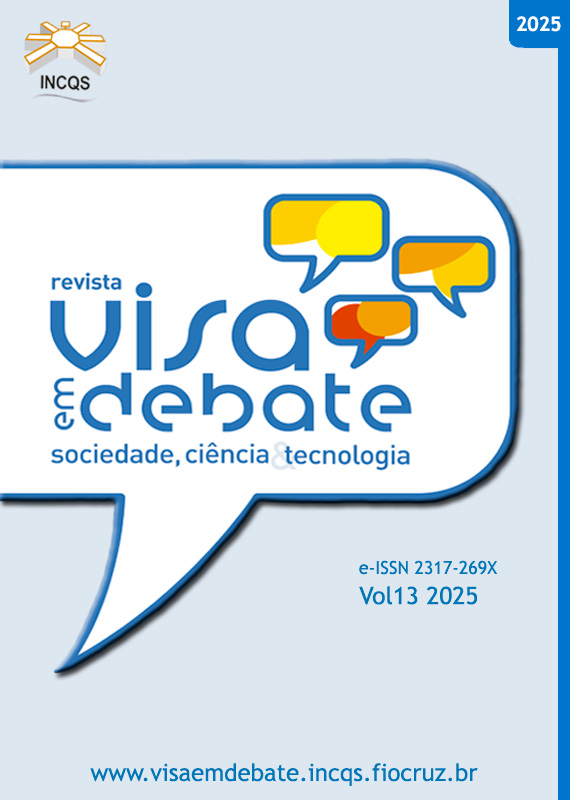Trajectory of the new cosmetovigilance regulation in Brazil: A documental review
Vigil Sanit Debate, Rio de Janeiro, 2025, v.13: e02391 | Published on: 29/04/2025
DOI:
https://doi.org/10.22239/2317-269X.02391Keywords:
Brazilian Health Regulatory Agency, Regulatory Impact Analysis, Cosmetovigilance, Social Participation, Product Surveillance, PostmarketingAbstract
Introduction: Cosmetovigilance protects public health by monitoring and preventing adverse events related to cosmetic products. Objective: To describe the trajectory of the development of the new cosmetovigilance regulation aimed at companies responsible for the regularization of cosmetic products in Brazil. Method: Documental review based on a systematic analysis of documents from the Brazilian Health Regulatory Agency (Anvisa), covering the period from April 2018 to August 2024. Aspects such as duration and stages of the regulatory process and participation of stakeholder groups were analyzed. Results: 251 documents were identified, of which 77 (30.7%) were included, representing the total regulatory activities executed by Anvisa. The process lasted six years and four months, concluding with the publication of Collegiate Board Resolution No. 894, dated August 27, 2024. The new rulemaking contains 55 articles in three chapters, with the chapter “Company Cosmetovigilance System” covering 85.4% of the articles. The three main stages were: public consultation of the proposed rulemaking (26.7% of regulatory activities), development of the regulatory instrument (25.3%), and social participation (22.7%). The public consultation and social participation involved nine and eight stakeholder groups, respectively, while the development of the regulatory instrument involved three groups, with notable engagement from the regulated sector. Conclusions: This study revealed a relatively lengthy regulatory process. Although the regulatory impact analysis and various social participation mechanisms prolonged the process, they reinforced the robustness and legitimacy of the published rulemaking. The extensive stakeholder participation and comprehensiveness of the new rulemaking suggest a significant advancement in cosmetovigilance regulation in Brazil.
Downloads
Downloads
Published
Issue
Section
Categories
License
Copyright (c) 2025 Health Surveillance under Debate: Society, Science & Technology

This work is licensed under a Creative Commons Attribution 4.0 International License.
COPYRIGHT ALLOWANCE The author (s) hereinafter designated as the ASSIGNOR hereby assign and transfer, free of charge, the ownership of the copyrights related to this ARTICLE to the Vigilância Sanitária em Debate: Sociedade, Ciência & Tecnologia (Health Surveillance under Debate: Society, Science & Technology) – Visa em Debate, represented by FUNDAÇÃO OSWALDO CRUZ, established at Av. Brasil, nº 4365, Manguinhos, Rio de Janeiro, RJ, Brazil, CEP 21045-900, under the conditions set out below: (a) The terms and conditions set forth in this Agreement shall apply to the following: 1. The ASSIGNOR declares that they s(he) is (are) the author (s) and owner (s) of the copyrighted property of the ARTICLE submitted. 2. The ASSIGNOR declares that the ARTICLE does not infringe the copyrights and / or other property rights of third parties, that the disclosure of images (if any) has been authorized and that they s(he) assume(s) full moral and / or property liability for its content, before third parties. 3. THE ASSIGNOR assigns and transfers all copyrights relating to the ARTICLE to the ASSIGNEE, especially the rights of editing, publication, translation into another language and reproduction by any process or technique. The ASSIGNEE becomes the exclusive owner of the rights related to the ARTICLE, and any reproduction, totally or partially, is prohibited in any other means of publicity, printed or electronic, without prior written authorization from the ASSIGNEE. 4. The assignment is free and, therefore, there will be no remuneration for the use of the ARTICLE by the ASSIGNEE.






